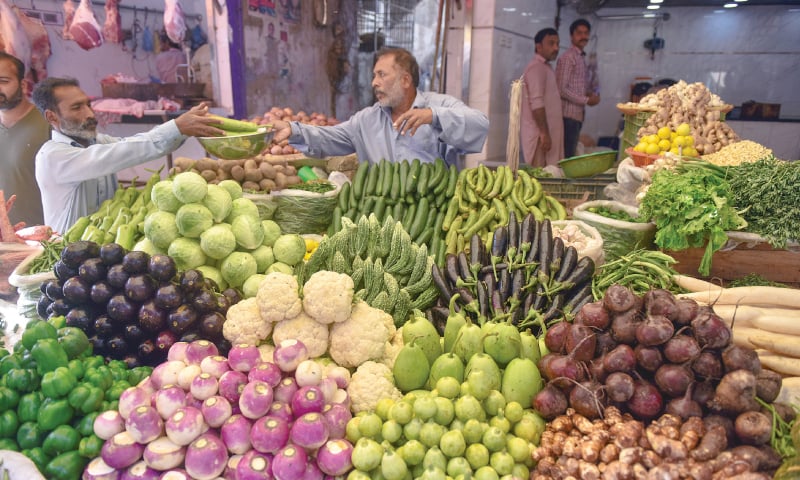KARACHI: Barring potato, prices of various vegetables witnessed substantial jump followed by crawling up of some pulses and sugar rates.
The most notable increase was recorded in green chillies to Rs140 per kg in wholesale market from Rs12-15 a kilo. As a result, retailers are charging Rs240-320 per kg. Many retailers are avoiding giving free green chillies to the consumers with the purchase of various vegetables.
The price of turrai (ridge gourd) and tinda (apple gourd) soared to Rs120 per kg from Rs80 and Rs50-60 per kg while gobi (cauliflower) rate went up to Rs60-80 from Rs40-50 per kg. Lokki (bottle gourd) sells at Rs80 per kg which was earlier Rs60 per kg. Peas are now being sold at Rs70-80 per kg as compared to Rs40-50 per kg.
Tomato prices have been under pressure for the last one month, hovering between Rs 120 and 140 per kg. Good quality onion is now tagged at Rs40 per kg versus Rs30 per kg.
No more free green chillies with vegetable purchases
Abundant supplies of potato from Punjab’s cold storage resulted in a major drop in price to Rs20 per kg from Rs30 per kg while some pushcart owners are offering five to six kilos of potato at Rs100.
Gajjar (carrot) price went up to Rs40 per kg from Rs30 per kg, while baigan (brinjal) rate climbed to Rs50-60 per kg from Rs40 per kg.
President of the Falahi Anjuman Wholesale Vegetable Market Superhighway Haji Shahjehan said the recent flooding and rains in Balochistan had slowed down the arrival of vegetables to Karachi.
He said tomato rates had never gone up in February and March but this year the trend had changed, taking its wholesale price to Rs90-100 per kg.
Shahjehan said tomato growers in Sindh had faced serious problems after using fake and substandard seed provided by various companies and their dealers to the red fruit growers. As a result, the crop could not ripe fully.
Onion’s wholesale rate jumped to Rs25 per kg from Rs15 per kg following end of Sindh crop and delay in arrival of Balochistan crop.
Potato’s wholesale price now hovers at Rs8 to Rs10 per kg owing to bumper crop this year.
In pulses, the wholesale price of mung and maash has risen by Rs25-30 per kg and Rs15 per kg. The new wholesale price of mung hovers between Rs 135 and 140 against Rs110 a few days back while the maash rate is now tagged at Rs110-115 as compared to Rs100 per kg.
After persistent rise in sugar’s wholesale rates for the last two month, the sweetener now costs Rs58 per kg as compared to Rs56 two weeks back while in January it was available at Rs54 per kg.
A wholesaler attributed price hike in maash to a slight rise in world price coupled with the rupee devaluation against the dollar, making imports costlier.
In mung, some big market players of Punjab are piling stocks as the new crop would arrive in the next two months. These traders are not releasing the stocks resulting in a shortage at Karachi’s wholesale market, he said.
However, the wholesale rates of gram pulse and masoor had been intact at Rs100-105 per kg and Rs76-82 per kg.
At the retail side, consumers are paying Rs140-160 per kg for mung, up by Rs20 per kg. The retail price of maash ranges between Rs 130-140, showing a jump of Rs10-15 per kg.
Gram pulse sells at Rs115-140 per kg depending on the quality while masoor is available at Rs 100-120 per kg. Sugar price hovers between Rs60-65 per kg at retail markets.
Patron in Chief of the Karachi Wholesalers Grocers Association (KWGA) Anis Majeed proposed that imported pulses could be transformed into an export sector by value addition on which the adviser to prime minister on trade, textile, industry, production and investment, Abdul Razak Dawood, had agreed to the association’s proposal.
He said Pakistan consumes 1.4-1.5 million tonnes of pulses annually while local production stands at about 500,000-600,000 tonnes while 700,000 tonnes are imported from Canada, Australia, the USA, Russia, Ukraine, Myanmar and African countries to meet the local demand.
From these imported pulses, after meeting our local demand, we can value add on them and export to nearby markets. It would open a new export sector for Pakistan besides helping in earning foreign exchange, Mr Majeed said.
Published in Dawn, March 18th, 2019














































